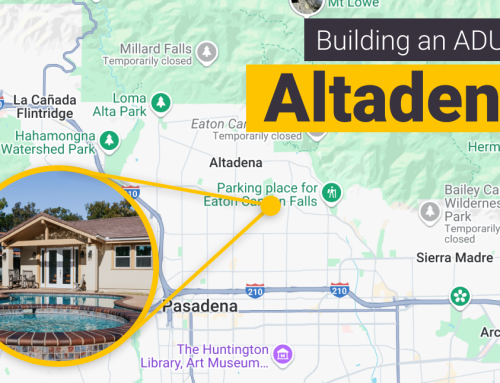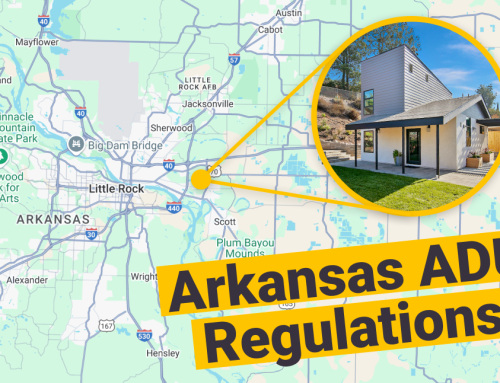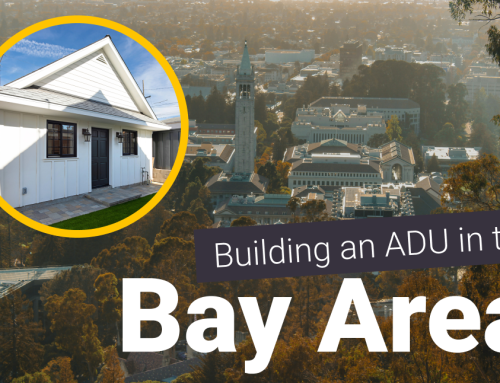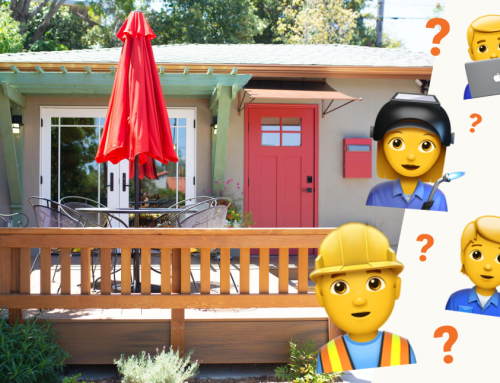Do you really need a general contractor (GC) to build your accessory dwelling unit? Yes, you do. Unless you ARE a contractor (and no, remodeling your kitchen doesn’t count), you need a general contractor for your ADU.
Here at Maxable we have a couple of mantras, and one of them is: An ADU is a house, not a remodel. It’s more than just a set of individual tasks; it’s a comprehensive undertaking that requires a seasoned professional. Homeowners who’ve navigated projects like kitchen or bathroom remodels might assume similarities with ADU construction, but the reality is vastly different.
We’ve developed a network of local, experienced ADU contractor partners as part of our program to help you design and build your ADU. Got your plans already? Fantastic! We’re happy to connect you with GCs right away.
Sourcing an ADU General Contractor
How do you find a local general contractor who is trustworthy, experienced, and understands the special challenges of building an accessory dwelling unit?
Rule number one: avoid any ADU contractor who is offering a super-cheap deal or whose bid is significantly lower than the others.
Our advice: back away from that bid!

Your home is one of the biggest investments of your lifetime. You don’t want to jeopardize its value.
When you cut corners in construction, you get poor results like shoddy work, substandard materials, long delays, and even abandoned projects!
“Our general contractor turned out to be a terrible businessman. He was running out of money so he apparently hired a cheap, inexperienced worker to install our ADU’s roof and skylight. It leaked badly, and we just got done replacing the whole thing.” – Lily H, Los Angeles
It’s easy enough to go on Google and search for “general contractors near me”, but picking from a list of results can be daunting with so much at stake. To safeguard your home’s value and avoid the pitfalls mentioned, it’s crucial to prioritize quality and expertise over shortcuts and cost-cutting measures in your search for a general contractor.
Consider these steps to make a more informed decision:
- Check Credentials:
- Look for contractors with the appropriate licenses, certifications, and insurance. This ensures they meet industry standards and can handle any unforeseen challenges.
- Review Portfolios and References:
- Examine their portfolio of completed projects, especially those similar to your ADU. Request references from past clients to gain insights into their work quality and reliability.
- Verify Experience:
- Prioritize contractors with significant experience in ADU construction. Their familiarity with the intricacies of such projects can prevent common issues and ensure a smoother process.
- Ask About Subcontractors:
- Inquire about their relationships with subcontractors. A reliable contractor collaborates with skilled professionals, reducing the risk of poor workmanship.
- Transparent Communication:
- Choose a contractor who maintains transparent communication. This includes discussing project timelines, potential challenges, and any necessary adjustments to the initial plan.
- Visit Ongoing Projects:
- If possible, visit current job sites to observe their work in progress. This provides a firsthand look at their workmanship and project management skills.
- Review Contract Details:
- Carefully review the contract terms, payment schedules, and warranty information. A reputable contractor provides clear documentation, ensuring mutual understanding.
- Online Reviews:
- While Google results can be overwhelming, take the time to read reviews on reputable platforms. Pay attention to both positive and negative feedback to gauge the contractor’s reputation.
Remember, the cheapest option may end up costing more in the long run.
Now that we’ve emphasized the importance of choosing a reputable general contractor for your home projects, it’s essential to delve into a common source of confusion – the distinction between a handyman and a contractor.
Handyman vs. Licensed Contractor: What’s the Difference?
The main difference between a handyman and a general contractor (GC) is that a general contractor is required to carry a license, whereas a handyman is not. Anyone with a hammer can say, “I’m a handyman.” Handymen are not required to show any proof of insurance, bond, or experience.
Licensed GCs are required to have two types of insurance:
- General liability insurance protects you in case someone is injured at the construction site.
- A surety bond legally obligates the GC to fulfill their contract. If the GC fails to do so, the surety bond covers the resulting damages or losses.
To obtain their license, a general contractor must have at least four years of professional experience conducted within the past 10 years.
But not all general contractors are the same. Even if they are licensed, the GC who remodeled your kitchen may not have the experience to build a home from the ground up. A general contractor who specializes in building ADUs handles a lot more than just building.
What is a General Contractor Responsible For?
Truthfully, you probably won’t see your general contractor all that much throughout the project. But, that’s because they’re working behind the scenes to keep the project moving and on track. Tasks can include ordering materials, coordinating with subcontractors, mapping the timeline, and more. Let’s dissect.

Your ADU contractor has a network of subcontractors
General contractors will often hire trusted subcontractors with whom they’ve completed many projects. Some of the construction trades that are commonly subcontracted are foundation and concrete flatwork, electrical, plumbing, drywall, and more.
A survey conducted by the National Association of Homebuilders found that it takes 22 subcontractors to build the average home. Two-thirds of the builders surveyed said they typically subcontracted about 75 percent of the construction costs. So your GC’s subcontractor connections are critical to a successful project.
“My ADU contractor was a perfect match. I thought it was going to be a hassle having to deal with construction for so long, but having the crew around was actually a lot of fun! They gave me some great ideas, like the Dutch door, which I think is now my favorite part of the ADU.” – Felicia S., San Diego
What’s a dutch door? You can check out Felicia’s project here!
Developing this network of subcontractors takes years of working in the industry to ensure that the people they are hiring are capable of doing quality work while staying on budget. GCs will often have built a relationship with these subcontractors based on trust, reliability, and a shared commitment to excellence. This extensive network becomes a valuable asset to both the general contractor and the client, ensuring a seamless coordination of skilled professionals who contribute to the overall success of the construction project.
Your GC creates a strategy for the supply chain
The supply chain is a term used to describe the series of companies that provide raw materials, products, and services to produce an end product—in this case, your ADU. It’s a complicated web, and a good GC will do their research and get you the best prices possible in the current market.
Things they take into consideration:
- What materials have they had trouble obtaining lately?
- Are there any materials, finishes, or fixtures that are currently in surplus so you could get a good deal on them?
- Is there anything on your wish list that needs to be ordered well in advance?
- Are there alternative products or materials you could consider if your first choice is unavailable?
Your GC maps out a complex timeline
A construction schedule depends on materials being delivered, labor being available, and city inspections. But things can and do interfere with the ideal schedule:
- weather
- homeowner change orders
- homeowner expectations
- delayed city inspections
- illness or other problems with subcontractors or the GC’s own crew
You should expect some delays and glitches—it’s hard to avoid every single obstacle! A good GC will be able to pivot when possible and keep the project moving.
Your GC manages the work site
Your GC should make sure their crew is on time, respectful, keeps the site tidy, and gets the work done to a high standard every day during construction. They should be available to talk with you about any aspect of the build and to handle any questions about the subcontractors, materials, and city inspections.
Your GC handles inspections
Your ADU project will go through several inspections throughout the construction process to ensure everything is being done up to code: electrical, foundation, plumbing, and most importantly, the final inspection.
Throughout the construction process, the general contractor is responsible for scheduling and coordinating these inspections with the appropriate authorities, such as building departments or utility companies. They must ensure that all work meets regulatory requirements and address any issues identified during inspections promptly. By overseeing these inspections, the general contractor helps ensure the successful completion of the construction project while maintaining compliance with relevant regulations and standards.
The smoother the inspection, the faster you can receive your Certificate of Occupancy and move your tenant in!
With all of this mind, you may be tempted to bring in a general contractor in ASAP, but there is an ideal time to start reviewing bids.
When should you hire your general contractor?
A good time to interview GCs is when you have a set of construction drawings. This is usually when your designer submits your ADU plans to the city for permitting. The permitting process can take anywhere from two months to six months or more, depending on where you live and the characteristics of your lot.
During that time you can talk to several different GCs and show them the detailed plans. We recommend interviewing at least three in order to get a sense of the range of possible construction costs.
If one of the bids is a lot lower than the other two (by $20,000 or more), that’s a red flag. It could mean one of two things:
- The GC is trying to bait you and will probably add more costs as the project moves forward.
- The GC is inexperienced in the industry and is not aware of what these projects actually cost.
The lower cost may seem enticing, but you need to think about the cost in the long-run. A poor construction job can lead to costly repairs down the line or even delaying your Certificate of Occupancy if the work is not done to code.

Cost is absolutely an important factor in making your decision, but so is finding someone you can communicate with. Personality matters! This is a person and crew who are going to be on your property for months. The process will go much more smoothly if you get along, understand the ADU contractor when they’re explaining something, and feel comfortable asking questions.
“We loved our GC. Just looking around our ADU, we are so pleased with the outcome. I can tell they have a standard of excellence.” – Cecilia C., Bay Area
What does a standard of excellence look like? Check out Cecilia’s ADU here.
How to Compare GC Bids
General contractors use different templates for their estimates, bid on different elements of the build, and include different items. You can’t accurately compare bids based only on their bottom lines. Just because contractor #1 includes an item or service that contractor #2 does not, it doesn’t mean #2 is trying to scam you. It just means that there is no industry standard for construction proposals and they’ve probably found a system that works for them. Ask questions. A good general contractor won’t hesitate to clear up confusion or clarify their system for you.
Some estimates include fixtures, appliances, and hardscaping, while others don’t. Material and labor costs are important, but things like the contractor’s payment schedule and change-order policy will affect your cash flow too.
There are some strategies for comparing GC bids, but the truth is that this is an area where you’ll really benefit from running the bids past an expert.
How Do you Find the Best GC for Your ADU Project?

The best GC for your project is going to have the following qualities:
- Specializes in ADUs
- Communicates effectively
- Has a great track record
- Has experience in your city and relationships with city inspectors
- Fits within your budget
- Is licensed, insured, and bonded
- Doesn’t have a one-year wait time
This list can be a tall order to fill, especially with a labor shortage on the rise. But, you don’t have to go about the process alone.

Design: Mayberry Workshop; GC/Landscaping: SFBay ADU
Whatever stage your project is in, we’ll source your general contractor
Hiring a general contractor is probably the most nerve-wracking decision you’ll make during your ADU project. It’s like buying a car times 1000! Most people only build an ADU once in their lifetime and have no experience with home building. That’s why we’re here: to guide you and provide the information you need to make smart choices.
We love to work with homeowners to design OR build their ADU. If you’ve already got a designer or your plans and permits are complete, get in touch! We’ll open our files and match you to excellent GCs in your area.
And if your ADU is in the daydreaming stage, reach out. We’ll help you figure out how to turn those dreams into reality. Your neighbors are doing it and so can you!
FAQs
Can I build my own ADU?
Yes, you technically can act as your own general contractor for your ADU project, but it comes with risks. For starters, building an ADU is a very big undertaking. Many people think it’s as simple as building a structure like a shed, but because ADUs are specifically intended for housing, they have a lot more requirements.
One of the most complex parts of the process is connecting your ADU to existing utilities—water, sewer, electrical, and sometimes gas. These connections often require trenching, detailed site planning, and coordination with local utility providers, and any mistakes can lead to costly delays or failed inspections.
If you have experience in construction project management, it may be feasible—but for most homeowners, the learning curve and time commitment can quickly become overwhelming, and especially costly.
What questions should I ask during the initial consultation with an ADU contractor?
During the initial consultation with an ADU contractor, it’s crucial to ask a series of questions to gather comprehensive information about their expertise, process, and approach to your project. Here are some key questions to consider:
- How many ADU projects have you completed?
- Are you able to provide references or examples of completed ADU projects?
- What is your availability?/ How soon would you be able to start my project?
- What is the estimated timeline for completing my project?
- How do you handle communication throughout the project?
- What subcontractors do you work with, and how do you select them?
And most importantly, make sure they are fully licensed and insured. These questions will help you gather essential information and make an informed decision when selecting the right ADU contractor for your project.
How long does it take to build an ADU?
The building phase of an ADU can take 8-12 months if you are using traditional stick-build construction. Building an ADU includes:
The full timeline including design, permitting, and construction is about 12-18 months.








